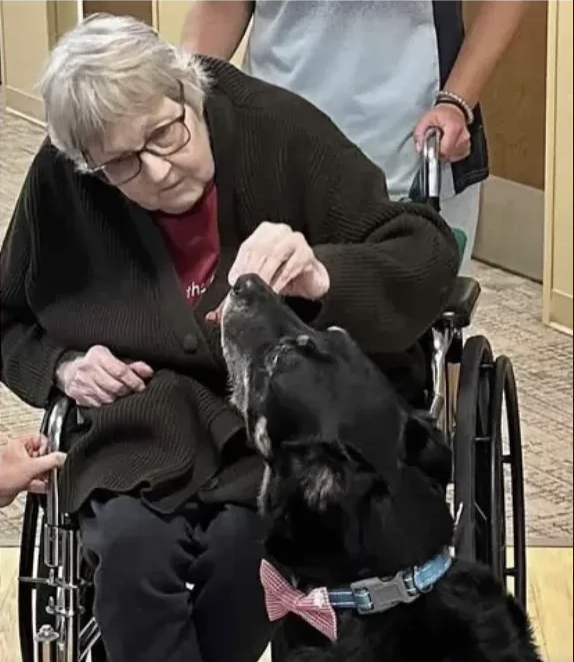
Eight years ago, a black dog appeared at the doors of a Michigan nursing home. No collar, no leash, just tired eyes and muddy paws. He quietly curled up on the lobby couch and fell asleep, as if he had finally found what he’d been searching for.
The staff called the local animal shelter across the street, and soon he was returned there. But the next morning, he was back—curled up in the same spot, tail thumping weakly when he saw familiar faces. Again, they walked him back. And again, he returned.
By the third time, the staff began to realize something extraordinary: this wasn’t a lost dog trying to find home. This was a soul who had already chosen his.
They named him Scout. He wasn’t just a visitor anymore—he was family.
From that day on, Scout became the heart of the nursing home. He wandered room to room, greeting residents, resting his head on laps, sensing who needed comfort most. He’d sit beside those who were lonely, accompany them on walks down quiet hallways, and curl up beside their wheelchairs as if to say, I’m here. You’re not alone.
No one trained him to do this. He just knew.
Residents began to look forward to his visits more than anything else. For many, Scout was a reminder of their own pets—of home, love, and the feeling of being cared for without needing to ask. Nurses often found patients smiling, their hands resting gently on Scout’s fur, hearts a little lighter.
When new residents arrived, Scout was the first to welcome them. When someone passed away, he’d wait outside their door, as if keeping silent watch. Over time, his presence became part of the rhythm of the place—the quiet heartbeat of a community built on care.
And through all these years, Scout never stopped returning. Even now, he walks those same halls, a little older, a little slower, but with the same devotion.
He didn’t wait for adoption papers. He didn’t need permission. He found where he belonged—and he stayed.
Because sometimes, it’s not us who rescue them. It’s they who rescue us.